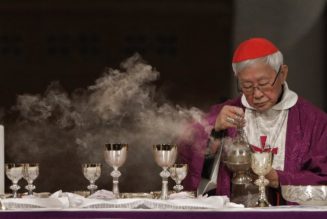By Dr. Jeff Mirus ( bio – articles – email ) | Aug 16, 2022
Northjersey.com’s report on the results of synodal discussions in New Jersey reveals the fault lines among those who self-identify as Catholics and have been willing to take part in the synodal process. The headline is revealing: ‘Too harsh’ and ‘out of step’: Survey finds NJ Catholics want a more inclusive church’. The story is somewhat more complex than that, but the emphasis in the discussions and in the headline are predictable.
I have a theory about all this, though it may be colored by my personal dislike of “meetings”, which seem to me to be about the most inefficient use of time imaginable. But especially in the case of the synodal discussions, it has been obvious from the first that they would become a sounding board for Catholics who no longer have (or perhaps never had) a serious commitment to the teachings of Jesus Christ. One of the grave problems with the democratization of Just About Everything over the past few hundred years—a problem, by the way, that is built directly into Protestant forms of Christianity—is that many people think religion ought to be just like everything else—malleable in accordance with the desires of those who wish to participate in it.
We live in an era in which people actually believe that consciences formed by the larger secular culture are capable of offering intelligent insights into how the Catholic Church needs to change—and particularly how it needs to be less “judgmental” and how it is “out of step”. Nine times out of ten—not always I admit, but nine times out of ten—this will be the opinion of those who: (a) Do not agree that Catholic doctrine comes ultimately from Jesus Christ, the incarnate God; and (b) Do agree that it is “unloving” of the Church to insist that those who claim membership should be willing to take advantage of her ministry to overcome their erroneous beliefs and habitual sins.
Predictable Issues
It is no surprise, then, that wherever discussions are opened to nominal Catholics who do not accept the teachings of Jesus Christ through His Church—that is, to largely culture-bound Catholics—there will be a strong desire to see the Church conform more to the ideas of the dominant culture, to stress things like greater involvement for women in Catholic leadership and and a more welcoming attitude toward those who are attracted to immoral sexual lifestyles of every type, including divorce and remarriage despite having already contracted a sacramental marriage within the Church. But while the Church obviously must always seek more effective ways to preach Christ and His call to conversion (“Repent and believe the gospel” as Our Lord put it in Mk 1:15) , the Church renders herself increasingly irrelevant by changing, concealing or downplaying her teachings on the serious sins and errors by which we are all bombarded constantly through the larger culture.
To be credible, the Church has always needed to be faithful to Christ. It is Jesus Christ the Son of God who established the male priesthood; it is part of God’s plan and, as such, something we should be learning from rather than dismissing as backward. It is Christ who established, both through the natural law and his own teaching, that human sexuality is ordered toward marriage between one man and one woman for both mutual love and support and the procreation and formation of children—that is, for the family. It is evident in both the Old and New Testaments—which the Church teaches are Divinely inspired—that the sexual perversions so widespread in pagan cultures are not acceptable for Christians, and must be repudiated. These things are so basic to both human happiness and eternal salvation as to be non-negotiable: They are givens of the moral law, and givens of a healthy society.
Yet we live once again in a pagan age, which, with the immense power of the culture that has become dominant among the rich and influential of our time, is directly and even deliberately organized against the Catholic Church and—if we would but only realize it—against Christ Himself, as being retrograde influences on persons and society, too harsh, and out of step with “reality”. The idea, were it not so seriously intended, could be the subject of a parody: It is laughable.
Those who have fallen into these ways of thinking (whether bishops, priests, religious or laity) need to be told clearly that they must choose between their worldly attachments and Jesus Christ, between their desire to justify sin and the Catholic Church. Of course they need also to be told that in the battle against sin they cannot expect to triumph all in a moment. That is, after all, the reason for the Church: She helps those willing to repent to grow in grace and holiness throughout their lives. But the justification of sin is incompatible with spiritual growth.
A sense of mission
Now I do not wish to be misunderstood. I do not state these truths in order to justify inaction on the part of the Church; I state them in order to promote a sense of mission. The Church faces two major problems in this modern period: First, Western culture has fallen away from its Christian roots and gradually degenerated into paganism; second, the Church herself has been deeply wounded by the corresponding increased worldliness of her members who, after all, are always drawn from the larger culture. Consequently, not only has the Church (considered in her transcendent being) lost a huge proportion of her influence over society as a whole, but also the Church (considered in her members) has succumbed to the very same temptations and falsehoods that have shaken a once largely Christian culture to its very core.
This means precisely what even the innumerable traitors in the fold have been saying: Yes, the Church does need a more effective ministry to retain and attract young people; the Church does need a more effective ministry to the divorced; the Church does need a more effective ministry to those who identify as LGBTQ+ and to the whole culture which invents a rainbow of options as the new normal. It may even still be true in some cases that the Church needs to learn better how to harness the strength and abilities of women.
A side note on the woman question, which is a separate issue and (as generally posed) hardly the same as justifying sin: Catholicism has always been very good at elevating women within each culture, as long as we are talking about an understanding of human gender consistent with the will of God. Deeply believing women have always been very evident in their contributions to Catholic faith and life. Moreover, if anyone sees renewal primarily in terms of more women being allowed to take on official ministerial roles, they are more likely to be a part of the problem than the solution. Authentic renewal is only very marginally about formal institutional “jobs”, and it ought to be self-evident that women have to guard as much as men against bringing secular models of activity into the Church, as if the Church’s structure must mirror the latest demands of a society which has no understanding at all of sexual difference, or of family life.
To return to the central issue: It ought also to be self-evident that the Church has not yet been very successful in responding to the ongoing secularization of the past 500 years or so, and particularly to the societal collapse of the last few generations, once the veneer of Christian moral stability began to be openly and victoriously jettisoned as irrelevant in the twentieth century. Remember, when we view the history of the West (the dominance of which is gradually fading in the world as a whole), we have a period, in round figures, of roughly thirteen or fourteen hundred years of increasing Christian influence, and now already a period nearly half that long of Christian decline. This long decline alone makes it completely clear that the Catholic Church needs a more pervasive and far more effective commitment to mission. It was, after all, one of the most important themes of the Second Vatican Council that not only priests and religious but the laity must be imbued with a sense of mission as a central component of their Christian identity.
Corrective formation
At the same time we must never forget that the sweep of history remains shrouded in the mystery of Providence. The Church, considered in her members from popes to lay people, is in constant need of purification. She was hardly as pure as the driven snow when Catholicism spread so rapidly and gradually reshaped the institutions of Western culture in the fourth through the twelfth centuries. The sins and deficiencies of both her leaders and her rank and file were legion then just as they are legion now. We can understand that all members of the Church must reflect that missionary zeal which is a participation in the saving work of Jesus Christ. We can understand that in our time the Church must accomplish this at least partially through greater internal discipline (inescapably reducing numbers further through the deliberate exclusion of those who publicly oppose her teachings). But the truth is that we do not know (I repeat, we do not know) exactly why the general historical trajectory was once uphill for a long time, and now it has been downhill for a long time.
Such things are hidden partially in the mystery of Divine Providence. I have written repeatedly that we are called to fidelity in this life, and not to visible success. We must all become more faithful, and we must root out what we might call “professional infidelity” from the Church, whether this infidelity takes the form of consistent and crafty denial of what our culture considers to be the Church’s “hard sayings”, or the form of a lazy “sinecurism”—the widespread feeling among clergy, religious and laity alike that our job is to check off the boxes of our states in life, without even a glimpse of mission. I will say it once again here: We are not called to be successful in numerical and institutional terms; we are called to be faithful in personal terms.
Nonetheless, we can learn something about what works and what does not. Over the past three generations, at least, what we have seen is that stable and deeply committed Catholic families—those who ensure that their children receive a counter-cultural formation and education both at home and through small and deliberately counter-cultural schools—find that the overwhelming majority of their children go on to be zealous Catholics as adults. By contrast, those who do not maintain this Catholic family focus and who do not form their children consistently both at home and in the schools they attend, find that the majority of their children go on to abandon the Faith for long periods of time, and perhaps forever.
This does not speak directly to the re-evangelization of the larger culture, but right now there are no apparent shortcuts. The tendencies of the dominant culture are universally hostile to an authentic Catholic commitment; the dominant culture approves and praises only those Catholics who insist that the Church is often wrong in her teachings and must perforce change them as soon as possible. But it is certain that counter-cultural Catholic families expand into counter-cultural Catholic schools and, as family members become more fully formed, they develop and participate in counter-cultural Catholic apostolates, foster counter-cultural priestly and religious vocations, and gradually provide the leadership for parishes and dioceses that foster a fuller and more vibrant counter-cultural Catholic presence in the world.
True synodality
Now, if we turn all this back to the topic with which I began—which is synodal discussion—it ought not to surprise us that a great deal of the discussion will be spiritually puerile and even faithless. The synodal effort will be effective only insofar as those whose vocations have put them into leadership positions in the Church can distinguish between comments which call the Church to accommodate herself more to cultural norms—to become less “harsh” and “out of step”—and comments that recall the Church to a sense of courageous and uncompromising mission, which ought to be the defining spiritual, psychological and sociological mark of all those who have been baptized into Jesus Christ.
The Church may have many members or few; she may have great worldly influence or almost none. That is largely hidden in the Providence of God. But to the degree that she is not significantly distinguishable from the larger human culture that surrounds her, she is burdened by a depressing human baggage which has blurred her essential identity and undermined her essential claims. We need not look farther than the Book of Revelation to learn what Our Lord thinks of all this. In chapters 2 and 3, the Son of Man sends clear messages to the “seven churches” which represent the fullness of the one Church:
- To the Church in Ephesus: “But I have this against you, that you have abandoned the love you had at first.” (2:4)
- To the Church in Smyrna: “You will be tested. Be faithful unto death, and I will give you the crown of life” (2:10)
- To the Church in Pergamum: “You have some there who hold the teaching of Balaam;…also you have some who hold the teaching of the Nicolatians. Therefore repent.” (2:14-16)
- To the Church in Thyatira: “But I have this against you, that you tolerate that woman Jezebel, who calls herself a prophetess and is teaching and seducing my servants to practice sexual immorality and to eat food sacrificed to idols.” (2:20).
- To the Church in Sardis: “I know your works. You have the reputation of being alive, but you are dead. Wake up, and strengthen what remains and is about to die.” (3:1-2)
- To the Church in Philadelphia: “Behold, I have set before you an open door, which no one is able to shut. I know you have but little power, and yet you have kept my word and have not denied my name.” (3:8)
- To the Church in Laodicea: “I know your works: you are neither cold nor hot. Would that you were either cold or hot! So, because you are lukewarm, and neither hot nor cold, I will spit you out of my mouth.” (3:15-16)
He who speaks these words to the Church is “the first and the last, who died and came to life” (2:8) and “the holy one, the true one…who opens and no one will shut, who shuts and no one opens” (3:7).
The Church must respond to synodal discussions with a recognition of which observations are part of the problem and which are part of the solution. We must make no mistake: Synodality is first and foremost about the Church, at every level, finding her “way together” with Jesus Christ, the Alpha and the Omega, the First and the Last, the Beginning and the End.
Sound Off! CatholicCulture.org supporters weigh in.
All comments are moderated. To lighten our editing burden, only current donors are allowed to Sound Off. If you are a current donor, log in to see the comment form; otherwise please support our work, and Sound Off!

Join Our Telegram Group : Salvation & Prosperity









